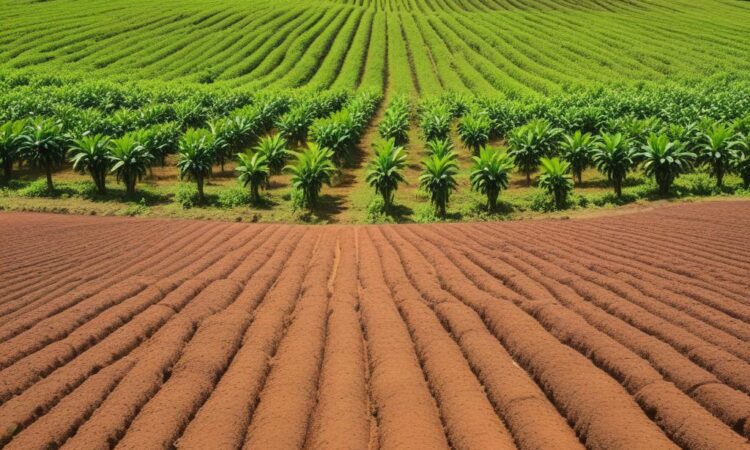Bad Weather Pushes Coffee Prices to Record High
Coffee drinkers are set to feel the pinch from soaring prices after crops in key producing regions were devastated by a combination of drought and unusually heavy rainfall. The impact of these extreme weather events has sent coffee prices to record highs, leaving consumers facing significantly increased costs for their daily brew.
The unprecedented weather patterns have wreaked havoc on coffee plantations across several continents. In [Country A], prolonged drought has withered crops, leading to drastically reduced yields. The lack of sufficient rainfall has left plants stunted and vulnerable, resulting in a significant shortfall in the expected harvest. Farmers report unprecedented losses, struggling to maintain their livelihoods in the face of such devastating conditions.
Meanwhile, in [Country B], the situation is equally dire, but for a different reason. Torrential rains and flooding have inundated coffee farms, damaging plants and hindering the harvesting process. The saturated soil has made it difficult for farmers to access their crops, and the excessive moisture has led to fungal diseases and other plant ailments that further reduce yields. The damage inflicted by the floods is extensive and will likely take years to fully recover from.
The combined impact of these extreme weather events in multiple coffee-producing regions has created a perfect storm, pushing global coffee supplies to critically low levels. This scarcity is directly reflected in the price, with wholesale and retail costs rising dramatically. Experts predict that this trend is likely to continue in the short term, with little relief expected until the next harvest season.
The increase in coffee prices is not just affecting consumers; it’s also having a significant impact on coffee shops and businesses that rely on coffee beans as a core component of their products. Many are facing difficult decisions, weighing whether to absorb the increased costs or pass them on to customers, potentially leading to reduced sales and profitability.
Beyond the immediate economic consequences, the situation highlights the growing vulnerability of the global food system to climate change. As extreme weather events become more frequent and intense, the stability of essential agricultural products like coffee is increasingly threatened. This underscores the urgent need for sustainable agricultural practices and climate change mitigation efforts to ensure food security for future generations.
The crisis is prompting calls for increased government support for farmers in affected regions. Many are advocating for financial aid, disaster relief programs, and investment in climate-resilient farming techniques. Without such support, the livelihoods of millions of coffee farmers are at risk, and the global coffee supply chain faces further disruptions.
Furthermore, the high prices are prompting consumers to reconsider their coffee consumption habits. Some are looking for more affordable alternatives, such as instant coffee or reducing their overall coffee intake. Others are exploring ethically sourced and sustainable coffee options, demonstrating a growing awareness of the social and environmental impacts of coffee production.
The current situation underscores the interconnectedness of global food systems and the far-reaching consequences of climate change. It’s a stark reminder of the need for concerted action to address both the immediate crisis and the underlying long-term challenges that threaten the stability of our global food supply.
Experts are warning that unless significant efforts are made to mitigate climate change and support coffee farmers, we can expect further price increases and potential shortages in the years to come. The future of coffee, and the livelihoods of millions who depend on it, hang in the balance.
The impact extends beyond just the price at the coffee shop. The increased costs are also affecting businesses that use coffee as an ingredient, like bakeries and restaurants. This ripple effect underscores the widespread economic consequences of the weather-related crop failures.
Many are looking for ways to adapt to the higher prices. Some consumers are brewing coffee at home more often, while others are exploring alternative beverages. The changing consumption patterns reflect a broader shift in how people respond to fluctuating food prices.
Governments and international organizations are grappling with the challenges of ensuring food security in the face of climate change. This situation highlights the need for long-term strategies to build resilience in agricultural systems and support farmers in adapting to changing conditions.
The situation serves as a cautionary tale of the vulnerabilities within the global food supply chain. It highlights the importance of diversifying sources, developing climate-resilient farming practices, and investing in sustainable agricultural research.
The high coffee prices also raise concerns about social equity. The increased cost disproportionately impacts lower-income households who may struggle to afford their daily coffee. Addressing these social inequalities is a crucial aspect of managing the ongoing crisis.
The crisis underscores the need for collaboration between governments, businesses, and consumers to find sustainable solutions. This includes promoting sustainable farming practices, supporting farmers, and fostering responsible consumption habits.
The future of coffee production is uncertain, but one thing is clear: the impacts of climate change are already being felt, and the need for proactive measures to address this challenge is more urgent than ever before.
The situation demands a multifaceted approach involving investments in climate-resilient agriculture, support for farmers, and adjustments in consumer behavior. Only through a concerted global effort can we hope to mitigate the negative impacts of climate change on coffee production and ensure the long-term sustainability of this vital commodity.
This crisis serves as a stark reminder of the interconnectedness of global food systems and the critical need to address climate change effectively. The future of coffee, and indeed many other agricultural products, hinges on our collective ability to respond to this challenge in a timely and decisive manner.
The ongoing crisis continues to unfold, with its full consequences yet to be fully understood. However, one thing remains certain: the world needs to address the challenges posed by climate change and build more resilient agricultural systems to prevent future crises of this magnitude.

